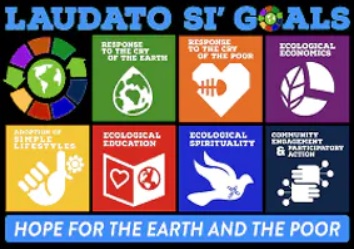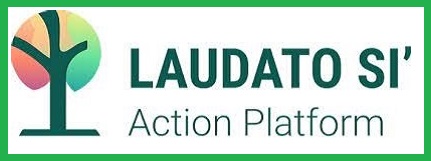
Click the image to enlarge
|
The Pope announced in May this year what is called the 'Laudato Si Action Platform'. It is the work of the Dicastery for Promoting Human Integral Development, which is a relatively new department of the Holy See. This has the responsibility for "issues regarding migrants, those in need, the sick, the excluded and marginalised, the imprisoned and the unemployed, as well as victims of armed conflict, natural disasters, and all forms of slavery and torture", which "takes place by attending to … justice, peace and the care of creation." [Pope Francis]What the Dicastery says is that: "The urgent challenge to protect our common home includes a concern to bring the whole human family together to seek a sustainable and integral development, for we know that things can change. The Creator does not abandon us; he never forsakes his loving plan or repents of having created us. Humanity still has the ability to work together in building our common home."
So, what is this Laudato Si Action Platform?
It is a major effort to mobilise Catholics worldwide to put into action the message of Laudato Si, Pope Francis' encyclical letter on Care for Our Common Home. The Pope wants us all to undergo an 'ecological conversion', because, he says, "We … need a new ecological approach, which transforms our way of living in the world, our lifestyles, our relationship with the Earth's resources and in general the way we look at people and live our life" to respond to "the cry of the earth and the cry of the poor".
It is a very ambitious programme which will be launched on 14 November, the World Day of the Poor, and will last for seven years, during what Cardinal Peter Turkson called 'this crucial decade', a decade which is critical for responses to climate change and environmental degradation. It also follows the UN Climate Conference in Glasgow (COP26) and, once that is over, "we get to do action", says Fr Kureethadam, the Dicastery's co-ordinator for ecology and creation. The seven years are a year of preparation, five years of action and a year of evaluation; it is a journey, rather than a single event.
The Action Platform outlines specific actions and goals for Catholics aimed at "families, parishes and dioceses, schools and universities, hospitals, businesses and farms, organisations, groups and movements, religious communities, working together", and that does not leave anyone out. And it is designed to address seven areas for action:
Response to the cry of the Earth,
Response to the cry of the poor,
Ecological economics,
Adoption of a simple lifestyle,
Ecological education,
Ecological spirituality, and
Community commitment.
In more detail, this means:
Response to the cry of the Earth: to work toward carbon neutrality through greater use of clean renewable energy and reduced fossil fuel use; support efforts to protect and promote biodiversity and guarantee water access for all.
Response to the cry of the poor: to defend human life from conception to death and all forms of life on Earth, while giving special attention to vulnerable groups such as indigenous communities, migrants and children at risk of trafficking and slavery.
Ecological economics: sustainable production, fair trade, ethical consumption and investments, investments in renewable energy, divestment from fossil fuels and limiting any economic activity harmful to the planet or people.
Adoption of simple lifestyles: to reduce use of energy and resources, avoid single-use plastics, adopt a more plant-based diet, reduce meat consumption and increase use of public transportation over polluting alternatives.
Ecological education: to redesign curricula around integral ecology, create ecological awareness and action, promote ecological vocation with young people and teachers.
Ecological spirituality: to recover a religious vision of God's creation, promote creation-centred liturgical celebrations, develop ecological catechesis and prayers and encourage more time in nature.
Emphasis on community involvement and participatory action around creation care at all levels of society by promoting advocacy and grassroots campaigns.
In November, 'Laudato Si' Planning Guides' will be made available for us all to use. What these are, we have yet to find out and it is a case of wait and see. But to back these up there will be resources and practical guidance provided on-line, which presumably is why it is called a 'platform'. We are assured that it is a ground-up approach, since it is a collaboration between the Vatican and an international coalition of Catholic organisations.
You can complete a registration form on the LS Action Plan website: https://laudatosiactionplatform.org/pledge-your-commitment/
More about the LS Action Platform at: https://laudatosiactionplatform.org/about/
and the goals are at: https://laudatosiactionplatform.org/laudato-si-goals/

Click the image for more information about the Laudato Si' Platform
See also the Laudato Si' Movement
|
ABOUT THE AUTHOR
Brian Austin is a Laudato Si Animator.
|